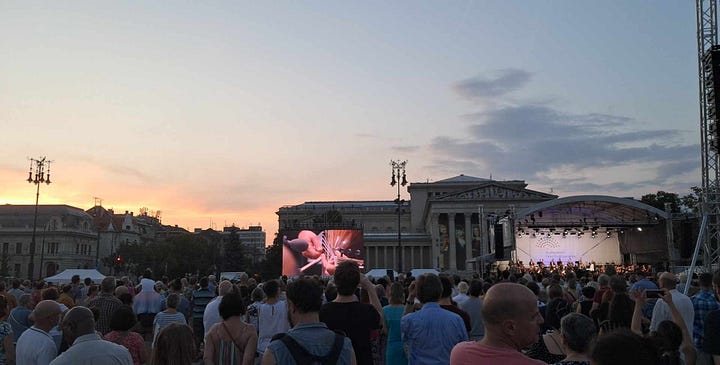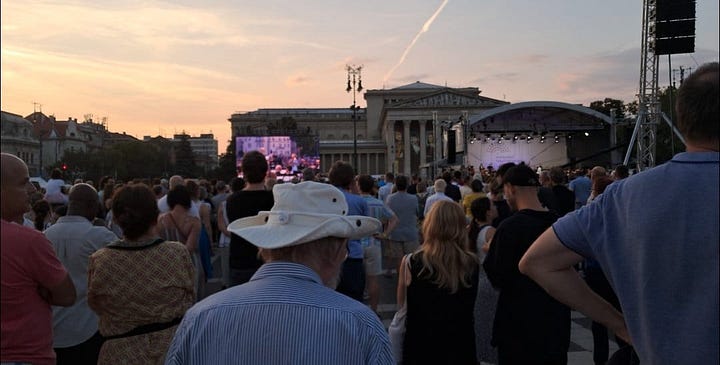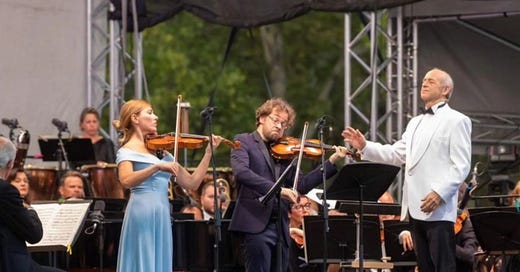The Zombie Afterlife of Hillary's Emails
A famous Hungarian conductor got caught up in this pseudo-scandal, and he's still battling those demons.
Saturday evening, I went to the Budapest Festival Orchestra’s season opening concert led by the renowned Hungarian conductor Iván Fischer. From an open-air stage on the iconic Heroes’ Square, Fischer led a program clearly aimed at recent world events. Billed as a “Concert for Peace,” Russian and Ukrainian soloists performed Bach’s Concerto for Two Violins. Israeli songwriter Idan Raichel sang three of his own works while Taiseer Elias, a University of Haifa professor and a Palestinian, played the oud.
My eyes were on Fischer, though, who took the stage in his signature white tuxedo.

Fischer is an internationally acclaimed cultural figure, but recently he’s had a rough go of it. In the US, he enjoys the patronage of Bill and Hillary Clinton. At home, Fischer’s budget was slashed when a leaked email to Hillary Clinton revealed his complaints about Prime Minister Viktor Orbán’s leadership. (In Hungary, cultural institutions get most of their money from government sources.)
But Fischer and Orbán no longer seem to be working at crosspurposes. Fischer and the BFO embraced music’s peacemaking power in Saturday’s well-attended concert: Heroes’ Square was mostly full even though the bricks were radiating heat from the recent torrid weather.
Orbán has been on a peace mission too, most notably in July when he shuttled between meetings in Kyiv and the Kremlin, where he met with Vladimir Putin.
Should we talk about Fischer joining Orbán’s fold? No, and I’ll explain why.
Not Her Emails Again
My reference to “Hillary Clinton” and “email” may bring a shudder to some readers. Not those emails, you might think. Yes, Iván Fischer was in those emails. In 2016, Wikileaks published the stolen contents of Hillary Clinton’s email account. It was early in the Trump era, when news outlets were still trying to figure out how to cover all these unprecedented breaches in political protocol. As if they were revealing classified intel, several major news outlets described banal exchanges - including one breathless report about former CIA Director Leon Panetta’s “secret” family risotto recipe.
But Leon Panetta’s nonna wasn’t the only one to suffer from the Wikileaks scandal. In Hungary, pro-government news outlets reported on a 2011 warning Fischer sent to Clinton, when she was preparing to visit Hungary as Secretary of State. Fischer described - years before the American press noticed - how Orbán was taking an authoritarian turn while disregarding human rights and freedom of speech.
Far-right Hungarian internet trolls responded by maligning and threatening the famous conductor, sometimes in blatantly antisemitic terms.
Orbán’s allies orchestrated a response: The Budapest municipal government - then controlled by Orbán’s allies - slashed its portion of the orchestra’s annual funding. Then Budapest’s mayor mocked Fischer when the conductor complained. (At the time, the mayor was an Orbán ally; Budapest now has a left-wing mayor.) For several years, the Budapest Festival Orchestra teetered on the brink of insolvency until Orbán greenlit a 2020 deal to restore the municipal funding.
In a statement after the agreement, Ivan Fischer said, “I am very happy, this is a very welcome and satisfactory arrangement which puts an end to years of cuts and uncertainty and allows us to concentrate on the music.”
The Peace Camp?
Orbán is currently trying to paint himself as an honest broker to end the Russian invasion of Ukraine. Since 2022, he has repeatedly claimed to be the leader of the “peace camp” in the international community. But it’s easy to see through Orbán’s peacemaker pantomime; he is far too friendly with Vladimir Putin. His calls for an immediate peace would only benefit Russia by ceding Putin de facto control of the territory he has taken by violent force.
So what to make of Iván Fischer’s “Concert for Peace”?
I don’t have any inside information about the intended message. I sat on the bricks in Heroes’ Square as a music lover and distant political observer. But I doubt Fischer has become some kind of Orbán lackey. I doubt that he has embraced peace to signal some kind of fealty to Orbán’s international agenda.
More likely, Fischer is just responding as a musician to the climate of international conflict, and drawing on a separate and independent trope beloved by classical artists: Music makes friends. As Leonard Bernstein said to a gathering following President John F. Kennedy’s assassination in 1963, “This will be our reply to violence: to make music more intensely, more beautifully, more devotedly than ever before.”
That both Fischer and Orbán are talking peace is just an accidental confluence of themes and agendas. It’s what sociologist Max Weber called an “elective affinity.”
Hungarian classical music and politics may sound the same; but the tunes they’re playing come from different historical and cultural sources.
What matters about elective affinities are the consequences, Weber insisted. Elective affinities matter because one system of meaning engenders a tendency for adherents to get on board with the other system of meaning, too. To belabor the metaphor a bit: It remains to be seen what kind of dancing will be inspired by Fischer’s and Orbán’s simultaneous peace-seeking efforts.


A Not-So-Elective Cultural Affinity
Fischer made a point of introducing the performers as “Ukrainian” Diana Tishchenko and “Russian” Alexander Sitkovetsky. After the Concerto, he got down from the rostrum and stepped between the soloists. Grasping their shoulders, he drew Tishchenko and Rozhdestvensky in. For a moment, the three brought their temples together and embraced while Fischer smiled broadly. Behind me in the crowd, a man shouted, “Bravo!”
Friendship and unity, not war and aggression, are laudable goals; but many Ukrainians would see the three-way embrace Fischer orchestrated as a victory for Russian cultural imperialism. For outside observers, it seems commonsensical that peacemaking efforts should involve Ukrainians and Russians together. They are the ones fighting, after all.
But when it comes to cultural relations, as a friend from Kyiv once told me, many Ukrainians prefer to ask, “What does Russia have to do with Ukraine?” The question is rhetorical for these Ukrainians: Nothing, of course.
Culturally, you go your way; we’ll go ours. And ideally the same on the battlefield. Go home, Russians, and leave us alone.
With this rhetorical query in mind, standing to applaud on Heroes’ Square, I saw the flip side to Fischer’s embrace of the Russian and Ukrainian performers. A Ukrainian might ask, why should Fischer have paired them together in the first place? It’s only because of Russian imperialism and aggression that it’s now heart-warming for us to see a Russian and Ukrainian embrace. Russian imperialism, it seems, has already achieved one of its goals: Russia and Ukraine are indelibly linked in the minds of some Western cultural elites, even though in an ideal world many Ukrainians would simply ignore Russia, going their own way with a nonchalant shrug.



